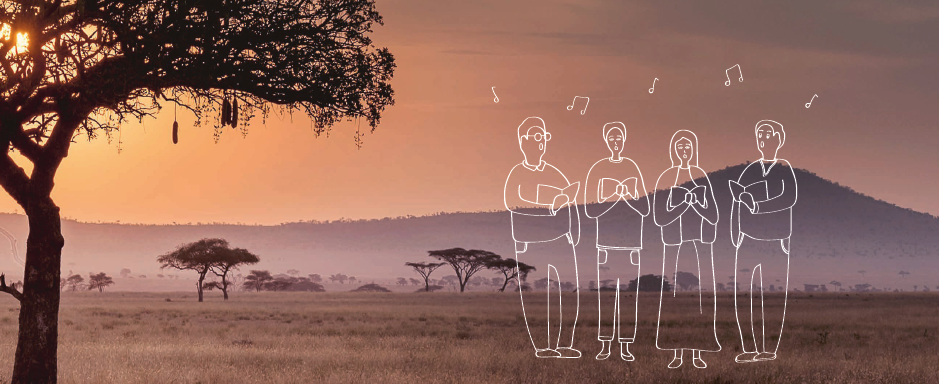Being Christ’s servant
CMS missionary Judith Calf served in Tanzania for many years, returned to Australia and is now back in Tanzania. Judith reflects on the daily challenges of serving in mission with humility, and how she seeks to follow the example of Jesus.
When I was asked to write about humility in mission, my first thought was ‘I am not comfortable with doing that!’ Writing about how I live out humility in my life and ministry in Tanzania feels boastful. I was uncomfortable too as I wondered how what I might write would reflect on my Tanzanian colleagues and friends. Nevertheless, after much thought and prayer, here are my reflections.
Starting with privilege
Greg Anderson describes how mission in particular contexts can be unavoidably hierarchical. It often involves ‘patron-client’ relationships, with privileged Westerners working alongside less-privileged individuals and communities.
So it is in East Africa. By the standards of many, I am rich and powerful.
I am not always financially richer, as more and more Tanzanians climb the economic scale. But I am rich in education, in access to resources, in life experiences from around the world, in knowledge, in being able to navigate information technologies. I am an mzungu—the word most commonly used since colonial days to describe white Europeans ruling over African nationals. I am a CMS missionary, which in the eyes of many Tanzanians places me in a position of honour and inherited respect (for all who have gone before me). Tanzanian Anglicans still esteem those who came with the gospel. And I am a Bible teacher—principal of a Bible college in a position of leadership and authority.
These attributes and more place me firmly in the ‘patron’ position. So does that make my colleagues, my students, and my friends the ‘clients’?
Adapting to culture
‘Patron’ and ‘client’ positions come with responsibilities and expectations. A patron’s role is to lead, guide, protect and defend. Should I then expect loyalty, respect and even obedience from my ‘clients’? I am greeted daily with ‘shikamoo’ —literally ‘may I hold your feet?’ (a sign of submission) by all who are considered lower than me in age, status and position. The response I give is ‘marahaba’—literally ‘I accept’. Although it often does not sit well for this Australian gal, raised in a flat and egalitarian culture where the tall poppy syndrome reigns, I respond appropriately to the salutations of my students and colleagues.
Humility in mission asks, when do I give the greeting of ‘shikamoo’ to another? Should I? Well, yes, I do. Sometimes I forget and roll into the familiar position of being a peer, a fellow servant, a co-worker in the gospel, because that feels more comfortable and reflects both my cultural values and those I see in the Bible. But at other times I consciously seek to honour others in a culturally meaningful way. I bob a short curtsy and say ‘shikamoo’ to a senior Christian leader, to an older lady I pass on my afternoon walks and even on occasions to a local government official. After more than 20 years of ministry in East Africa, it comes more easily.
Following the example of Jesus
I’m guided by the model of Jesus described by Paul in Philippians 2. Jesus left his power and authority, emptying himself to be a slave so that he could complete his Father’s mission, even unto the cross. As a patron I am guided by the model of Jesus the rabbi, as he led his own disciples with conviction, patience, love and authority.
So when I teach my students, it is not just the words of the classroom, but how I interact with them that counts most. On Thursday nights we have fellowship meetings in my house. As I sing and dance, and join in the all–together praying in loud voices, I step outside my comfort zone. I share my own prayer needs and together we are the body of Christ in action. Where possible, I provide for some of their material needs—a bus fare and cash after an urgent call to return home because of a sick wife or deceased family member, a loan to help buy a sewing machine so an evangelists’ wife can provide income for the family, a visit to their home village and church, eating their food and sharing in their community.
I also receive their gifts with gratitude—a chicken, some eggs, bananas; asking that they help me with cutting the grass, or clearing my driveway—honouring their role as the client, providing a way for them to fulfil their obligations in a meaningful but not humiliating way. Is this humility in mission? It sits more comfortably to see it as accumulated wisdom and cultural understanding from living and serving in love with my Tanzanian brothers and sisters. It is an intentional honouring of their cultural values as we strive together to be servants of Christ.
The hardest battle
Perhaps my hardest battle in humility in mission is returning to my own cultural heritage and church. I become more the client than the patron; the lesser one. I am dependent, relying on the generous giving of others. I cannot demand support, but just humbly ask that others may be led by God to partner with me in mission. At a personal level, humility in mission takes on the face of accepting that some in the Australian church receive my ministry of teaching and training up church leaders with great joy, but others reject it. Jesus knew this struggle, and yet persevered in love, listening to and heeding the voice of his Father. This is my prayer, that I neither be Australian, nor Tanzanian, but simply a servant of Christ, with a message of grace and forgiveness to all the nations.
Give
As Australians, we have been placed in a position which enables us to give generously to support others as they seek to model and teach Christ across the world. Support missionaries like Judith.












































































































